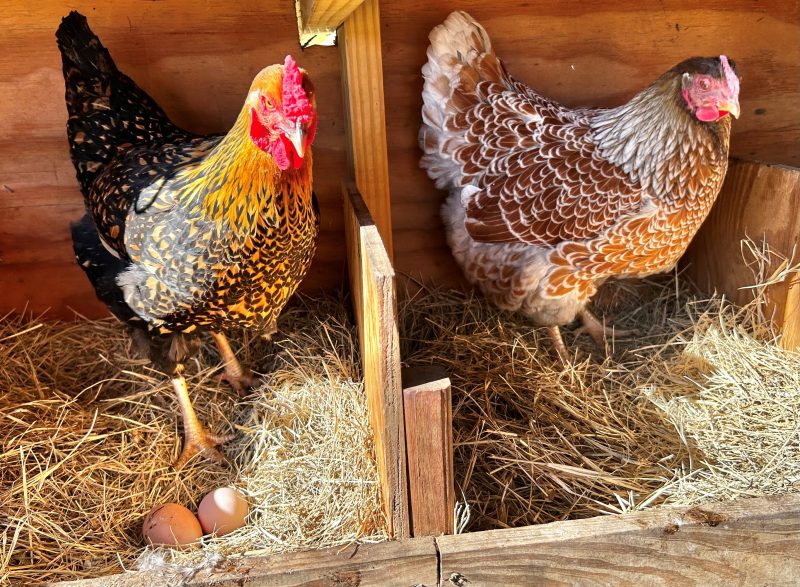It’s been chilly outside! Christmas is just around the corner and we are all looking forward to the holidays. Choosing the right bedding for your chicken coop might seem straightforward, but several factors play a crucial role in ensuring the health and comfort of your feathered friends. From moisture control to cost, each aspect can significantly impact your chickens’ daily lives. Here is a guide to key considerations to help you make the best choice for your coop.
–
Moisture and Odor Control
Opt for bedding that is highly absorbent to keep your coop dry. Wet bedding can foster bacteria and mold growth, leading to respiratory issues among your chickens. Chicken manure can produce odor, and an accumulation of manure increases ammonia levels, which can be harmful to your flock. Wet bedding can also cause foot problems, such as abscesses, due to the bacteria present.
–
Insulation
Bedding is essential for insulating your coop during winter months. Materials like straw, hay, or shavings trap air, helping to maintain warmth when temperatures drop.
–
Insect Control
Maintaining a clean and dry environment will help deter pests. Some bedding options, such as cedar shavings, naturally repel certain insects. It’s advisable to change bedding monthly and treat your coop to control bug populations effectively.
–
Cleaning, Cost & Availability
Choose bedding that suits your lifestyle. If you’re busy, consider options that don’t require daily cleaning. At least once a month, strip the bedding, treat for pests and odors, and refresh with new bedding. Keep your budget in check, especially if you manage multiple coops. Select bedding that is readily available when you need it.
–
–
Bedding Options
-
Shavings: Highly absorbent and soft, shavings are an economical choice that composts well. However, they can be dusty, potentially leading to respiratory problems. Some may avoid cedar shavings due to their strong scent, while others appreciate its odor-controlling properties.
– -
Sand: This option is convenient and cost-effective, with some finding it easy to clean. However, others argue it can become muddy and harbors diseases. Sand offers no insulation during cold weather.
– -
Straw/Hay: Known for its excellent insulation and affordability, straw is a popular choice. Still, it is prone to mold when wet and may attract insects, requiring more frequent cleaning.
– -
Pellet Bedding: While it can be consumed by chickens, leading to digestive issues, pellet bedding is highly absorbent and easy to clean when wet.
– -
Newspaper/Paper: This option is somewhat absorbent and dust-free, but it may require daily or multiple cleanings. Wet paper can become slippery, posing a risk for your chickens’ legs.
–
Conclusion
Every coop and situation is unique, so what works for one may not work for another. Experiment with various bedding types to find the right fit for your needs and budget. The ultimate goal is to maintain happy, healthy chickens without breaking the bank!
By considering these factors and options, you can ensure your coop remains a safe and comfortable environment for your flock. Happy chicken keeping!
–
Written in Collaboration  with Jewelynn Owens, Lead for American Fellow, serving with UF/IFAS Extension Holmes County.
with Jewelynn Owens, Lead for American Fellow, serving with UF/IFAS Extension Holmes County.
- Big Doe Contest Returns for 2025: A Growing Thanksgiving Tradition - November 14, 2025
- UF/IFAS Extension Panhandle Cattlemen’s College Announces Scholarship Opportunity for Florida Youth – Application Deadline September 15 - August 29, 2025
- Foot Rot Prevention and Treatment for Cattle - August 15, 2025


